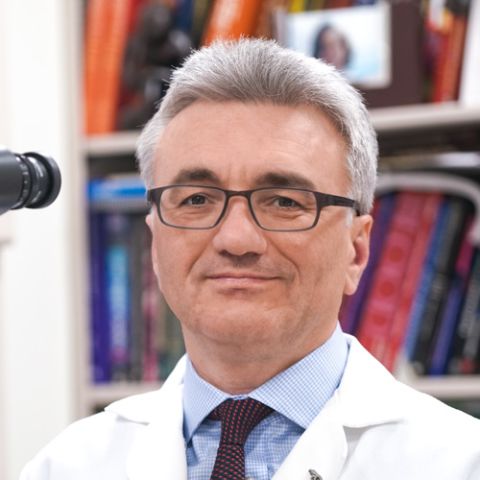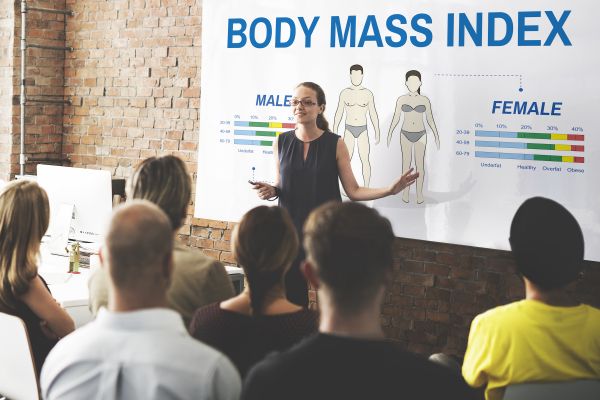I was diagnosed with cancer on August 27, 2015. Now, as a survivor, every August 27 I remember and give thanks for all the people who helped me that day and in the ensuing years. This year, I added some people I’ve never even met to my gratitude list. This is my thank you to the technicians and doctors of Roswell Park’s pathology lab.
I’ll never forget the day I was diagnosed with cancer. I was scheduled for surgery at Roswell Park, with the understanding that if the mass on my right ovary was benign, the ovary would simply be removed. However, if the mass was malignant, I would have a complete hysterectomy, both of my ovaries would be removed, and I would need additional treatment.
As I was wheeled into the pre-surgery anesthesia suite, I remember talking with the anesthesiology team. One doctor wore a Notre Dame surgical cap. I told him I am a University of Michigan fan. He joked that he was now going to have to give me extra anesthesia.
Several hours later, I woke up in a hospital room. My husband held my hand as my wonderful doctor, Stacey Akers, MD, FACOG, explained to me that I had ovarian cancer. However, after removing both of my ovaries, fallopian tubes, uterus, lymph nodes and other possible traces of cancer (a process called debulking), Dr. Akers felt optimistic about my prognosis.
Dr. Akers was right. On this fourth anniversary of my diagnosis, I again thought of all the people who helped me through my journey. But as I looked through my pathology report in the OpenNotes section of my Roswell Park Patient Portal, I realized there were several people from that day whom I do not recall; in fact, I have never met them, nor have I ever thanked them for their part in my survival. And yet so much of that day and my treatment in the following months depended on their expertise.
Those people are Roswell Park’s Pathology Department, and they include the lab technicians who quickly prepared slides of the tumor and tissue samples from my surgery, and the pathologists, Mihai Merzianu, MD, and John Kasznica, MD, who examined those slides and determined that the mass in my right ovary was malignant.
I’d always wondered what transpired while I was on the operating table, once Dr. Akers removed that mass. How long did it take before she received the pathology report? What steps needed to take place?
In speaking with Gissou Azabdaftari, MD, former Chief of Cytopathology and Head of Genitourinary Pathology, I learned several things about my pathology that illustrate how getting the correct diagnosis quickly led to the correct treatment — and my survival.
In some cases, pathologists need a few days to fully prepare and examine the tissue and cell samples they receive. However, my case was an intraoperative frozen section pathology review, meaning that the pathologists must provide a diagnosis very quickly to give the surgeon the proper information that guides their next steps during a surgery or procedure. “In nearly all intraoperative frozen section pathology reviews at Roswell Park, the surgeon will have a diagnosis from the pathologist within 20 minutes,” explains Dr. Azabdaftari.
The intraoperative frozen section pathology part of my pathology report confirms that. At about 10 a.m. that morning, Dr. Akers surgically removed my right ovary. Within 20 minutes, a slide of a frozen section of the organ had been prepared and examined, and Dr. Akers received word from Dr. Merzianu that a carcinoma was present. This diagnosis guided Dr. Akers to proceed with the removal of additional organs and some lymph nodes. Again, within 20 minutes of receiving these tissues, the pathology lab reported that they were negative for cancer cells, allowing Dr. Akers to determine that more extensive surgical measures were not required at that time.
“The trust and communication between our surgeons, oncologists and pathologists is crucial,” says Dr. Azabdaftari.
Roswell Park's Pathology Department
Learn why doctor you never meet may be the most important person on your care team.
Sign up!My pathology report also shows that in subsequent days, the pathologists performed additional tests and analyses of the remaining tissues that were removed. These included tests to determine my tumor's stage, whether I had certain genetic markers and if I might be a candidate for clinical trials. These results were then relayed to Dr. Akers within a week, allowing her to develop an appropriate treatment plan for me.
I also learned how important it was that pathologists who focus exclusively on organ-site cancers perform the testing and analysis.
“On a normal day, each pathologist at Roswell Park examines several biopsies. With the high volume comes specific knowledge and expertise,” says Dr. Azabdaftari. “Our pathologists further specialize in identifying specific types of cancers, focusing on breast, gastrointestinal, genitourinary, gynecologic, head and neck, soft tissue and melanoma, thoracic, central nervous system, pediatric or hematopoietic cancers.”
Every patient’s treatment plan is built on this expertise. Roswell Park pathologists routinely offer second opinions, performing reviews of biopsies and pathology done elsewhere, and always conduct this review for all new patients. These secondary reviews have resulted in a change in diagnosis — that may affect treatment decisions — in many cases.
And so, as I begin my fifth year of cancer survivorship, I am again grateful to all the people I have met at Roswell Park Comprehensive Cancer Center, and also to all those behind-the-scenes people, including the Pathology team, who contributed to my survival. I may never have met you, but I most certainly appreciate all you did for me.
Editor’s Note: Cancer patient outcomes and experiences may vary, even for those with the same type of cancer. An individual patient’s story should not be used as a prediction of how another patient will respond to treatment. Roswell Park is transparent about the survival rates of our patients as compared to national standards, and provides this information, when available, within the cancer type sections of this website.



